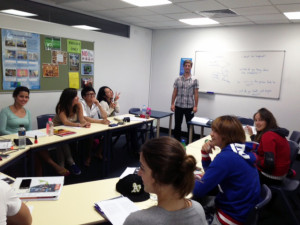 This week’s blog is written by Tim, our awesome level 5 teacher, at the Gold Coast campus. Over the years he has heard errors which keep popping up in his classes. His blog is to help learners with a few errors which Tim considers common in learners of English. The errors are followed by quick explanations on what is correct and why. We hope you enjoy.
This week’s blog is written by Tim, our awesome level 5 teacher, at the Gold Coast campus. Over the years he has heard errors which keep popping up in his classes. His blog is to help learners with a few errors which Tim considers common in learners of English. The errors are followed by quick explanations on what is correct and why. We hope you enjoy.
You might be reading this on your break at work, on the train or at the airport, or in any number of places on your smart phone. So, here are a few quick tips (pieces of advice) to improve your English language skills by fixing common mistakes.
Red words show mistakes and green words show the correct example.
1: Introductions
He is Roger. (Correct, but not for introductions as it sounds unfriendly)
This is Roger. (More natural)
He has 23 years old. (Possession can’t be used for age)
He is 23 years old. (Need to use a be verb)
He will finish studying here in more two months. (wrong position in the sentence, and more is for “how long”, but not a point in time)
He will finish studying here in another two months.
2: Collocations (words that go together):
Make a party
Have a party (or throw a party in informal English)
Make a barbeque party (wrong verb, and a barbeque or a b.b.q. is not the same as a party.)
Have a barbeque
Make homework
Do homework
Make a test
Do/Take a test
I was able to make some amazing memories (memories are something that you receive as a result of the situation, so you can’t make them!)
I have had some amazing experiences.
Or
I will take some beautiful memories with me.
3: Present Simple Mistake
I haven’t a drivers’ license (correct, but too formal and obscure)
I don’t have a drivers’ license. (don’t and doesn’t can be used as negatives in the present simple, and didn’t in the past simple)
Or
I haven’t got a drivers’ license (informal British English for possession)
4: Other Common Mistakes
I met many other countries’ people.
I met many people who are from other countries. (Better)
I met many people from other countries. (The best)
My owner is very friendly. (They own your apartment, but not you!)
My landlord is very friendly.
5: Articles
I love the nature.
I love nature. (in general, so no article)
He is in the class.
He is in class. (No article. It’s a class in general and the specific type is not important.)
or
The afternoon class starts in ten minutes. (use the, for the specific example of a class).
I hope that my examples of common, but easy to fix mistakes can improve your English skills and make your spoken English sound more natural.
By Timothy Green
Langports English Language College.